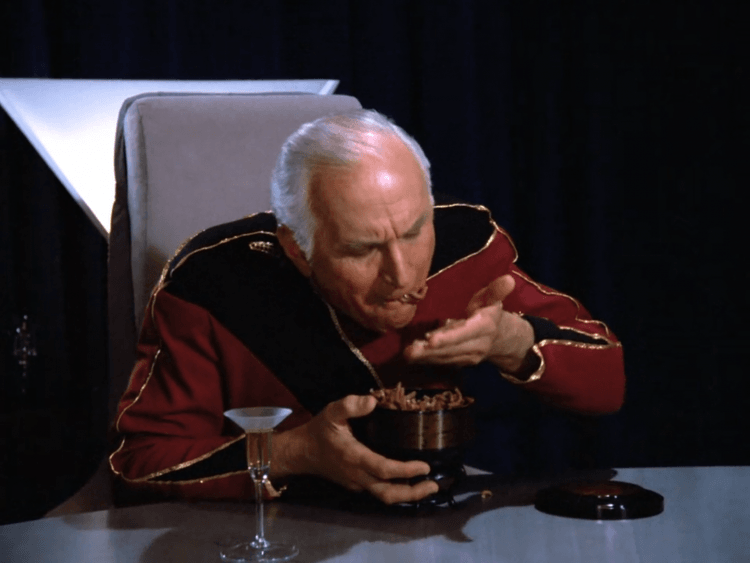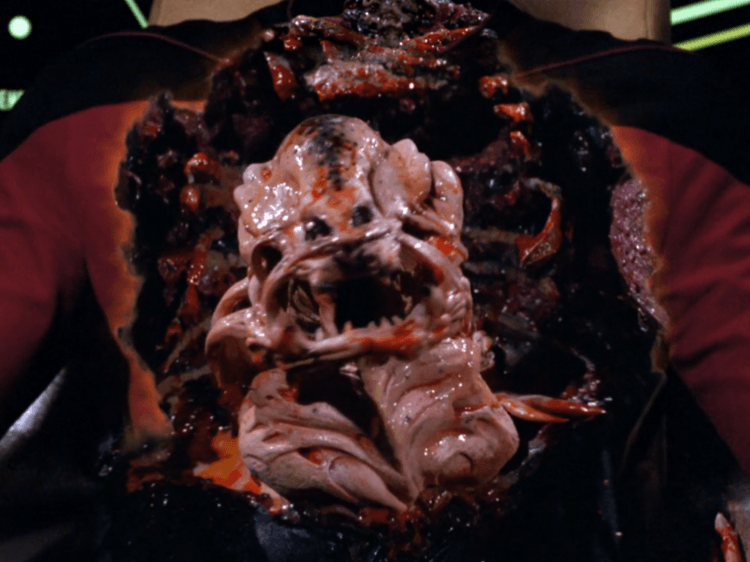 It’s admittedly a low bar to clear, but ‘Conspiracy’ is easily one of the better episodes to come out of the first season of ‘TNG’. It’s also an interesting one because Hurley wasn’t wrong when he described it as unusually dark and violent. This was certainly the case at the time (when the ‘Star Trek’ canon consisted of the original series, a short-lived cartoon, four movies, and most of a spinoff season), but even thirty years later it manages to stand out from the pack in this regard. To be sure, ‘Trek’ has done dark and violent in the years since, most notably on ‘Deep Space Nine’ (which, in fact, did do a story about an attempted coup by rogue elements in Starfleet – the very pitch that Hurley rejected in ‘Discovery’).
It’s admittedly a low bar to clear, but ‘Conspiracy’ is easily one of the better episodes to come out of the first season of ‘TNG’. It’s also an interesting one because Hurley wasn’t wrong when he described it as unusually dark and violent. This was certainly the case at the time (when the ‘Star Trek’ canon consisted of the original series, a short-lived cartoon, four movies, and most of a spinoff season), but even thirty years later it manages to stand out from the pack in this regard. To be sure, ‘Trek’ has done dark and violent in the years since, most notably on ‘Deep Space Nine’ (which, in fact, did do a story about an attempted coup by rogue elements in Starfleet – the very pitch that Hurley rejected in ‘Discovery’).
But while ‘Deep Space Nine’ got up close with the horrors of war, the violence in ‘Conspiracy’ feels more akin to the first season of ‘Discovery’, which at times felt like it was indulging those impulses simply because it could, with the traditional content restrictions of network television now a thing of the past. ‘Conspiracy’ doesn’t take it quite that far, of course, but it is very obviously an episode that is testing the waters and seeing just what it can get away with. I don’t count that against it, but suffice it to say that in both tone and content, ‘Conspiracy’ isn’t exactly a typical hour of ‘TNG’.
As you can probably tell from the length of my synopsis, ‘Conspiracy’ isn’t the most plot-heavy episode, instead favoring an atmosphere of paranoia and suspicion. It’s only in the fifth act that the pieces all come together and the plot kicks into gear. That’s not exactly a problem (though I am admittedly more of a plot person in terms of preference) since it does a decent job of cultivating that atmosphere. It does, however, mean that the actual narrative starts feeling like a race to the finish, particularly when the parasites start monologuing at Picard during the dinner scene.
 I also can’t fault Roddenberry’s objections to the earlier versions of the story, which I summed up earlier. But even in the finished episode, there are some notably un-‘Star Trek’ elements (which Hurley also initially objected to). The big one is, frankly, the resolution. Specifically, the violence thereof. Now, I’m not someone who has any particular problem with media violence. Quite the opposite, in fact, as I’ve spent more than my share of time and money on all sorts of sick and twisted horror movies. But this is ‘Star Trek’. And while ‘Trek’ has never shied away from action, it’s the context that matters. And usually, the context is that of a last resort, of preferring to solve problems with science or diplomacy rather than phasers. This is particularly the case in the ‘Next Generation’ era.
I also can’t fault Roddenberry’s objections to the earlier versions of the story, which I summed up earlier. But even in the finished episode, there are some notably un-‘Star Trek’ elements (which Hurley also initially objected to). The big one is, frankly, the resolution. Specifically, the violence thereof. Now, I’m not someone who has any particular problem with media violence. Quite the opposite, in fact, as I’ve spent more than my share of time and money on all sorts of sick and twisted horror movies. But this is ‘Star Trek’. And while ‘Trek’ has never shied away from action, it’s the context that matters. And usually, the context is that of a last resort, of preferring to solve problems with science or diplomacy rather than phasers. This is particularly the case in the ‘Next Generation’ era.
So you can see why it creates a bit of an issue when Riker and Picard pull their phasers and go Rambo on the mother creature. It’s especially glaring as the creature inhabiting Remmick insists on a desire for peaceful co-existence – a Starfleet solution if ever there was one. Granted, Remmick’s tone and the behavior of the conspirators generally does cast doubt on that, but our heroes don’t seem to give a moment’s thought to the possibility that it’s being sincere, nor to the possibility of an actual negotiated truce, and instead open fire almost immediately. Picard even acknowledges this in passing as he ties up the dangling plot threads in a log entry, but frankly that just reeks of raising the issue just so that you can say you acknowledged it as opposed to actually dealing with it.
Earlier I described ‘Conspiracy’ as “interesting” and “one of the better episodes” of the first season. And that’s all lovely, but you may still be wondering, “Is it actually any good?” And for the most part, yes. It’s not what I’d call a classic, but by and large it works for me. It’s a clear sign that the show is on the upswing (though it still has quit a ways to go). It’s effective in its eeriness, and the last act is action-packed in a way I don’t usually associate with ‘TNG’ (particularly the earlier episodes).
 And let’s not mince words. Philosophical qualms notwithstanding, the bit with Remmick’s exploding torso and the mother creature within is bloody cool! Not only is it among the most memorable visuals of the season (if not the series), it was one of the first things I wanted to see in high def when I picked up the Blu-ray box set earlier this year.
And let’s not mince words. Philosophical qualms notwithstanding, the bit with Remmick’s exploding torso and the mother creature within is bloody cool! Not only is it among the most memorable visuals of the season (if not the series), it was one of the first things I wanted to see in high def when I picked up the Blu-ray box set earlier this year.
But it is also kind of a frustrating episode, though it’s frustrating in ways that are (mostly) not entirely its fault. Most notably, it teases a follow up that never materialized. Interestingly, that wasn’t part of the original ending. It was suggested later in the process by producer Robert Justman.
And while it is, I would argue, a better ending (had the episode ended with the parasites defeated and everything tied up in a neat little bow, I doubt we’d still be talking about it today), it’s also a pretty glaring loose end. Additionally, it suffers somewhat from the need to pack the story into the space of a single episode. This is just a product of the highly episodic nature of the medium at the time, and as I said earlier, ‘Conspiracy’ isn’t a terribly plot-heavy episode to begin with. But it’s hard not to wonder what might have been, especially when ‘Deep Space Nine’ did a better job of tackling the notion of a conspiracy/coup in Starfleet in the space of a midseason two-parter (season four’s ‘Homefront’ and ‘Paradise Lost’ duology).
 That brings us to the real problem with the story’s brevity. It’s not that brevity in and of itself, nor is it the episode’s focus on atmosphere over plot. Rather, it’s that this actually was a two-episode arc! The possibility that something was rotten in the state of Starfleet was set up a few episodes earlier, in ‘Coming of Age’ (an episode which also introduced Quinn and Remmick). In ‘Coming of Age’, though it was a B-story, mostly developed through Remmick’s interrogations of the bride crew. It was then seemingly dropped entirely until this episode, in which the plot is exposed and thwarted. Again, there is an extent to which this is just the nature of the beast (the beast being syndicated TV in the late 1980s), but it nonetheless leaves a potentially very interesting storyline feeling like something of an afterthought. Imagine if this could have been explored in a more serialized format. Even ‘Deep Space Nine’ kept its two-parter relatively self-contained.
That brings us to the real problem with the story’s brevity. It’s not that brevity in and of itself, nor is it the episode’s focus on atmosphere over plot. Rather, it’s that this actually was a two-episode arc! The possibility that something was rotten in the state of Starfleet was set up a few episodes earlier, in ‘Coming of Age’ (an episode which also introduced Quinn and Remmick). In ‘Coming of Age’, though it was a B-story, mostly developed through Remmick’s interrogations of the bride crew. It was then seemingly dropped entirely until this episode, in which the plot is exposed and thwarted. Again, there is an extent to which this is just the nature of the beast (the beast being syndicated TV in the late 1980s), but it nonetheless leaves a potentially very interesting storyline feeling like something of an afterthought. Imagine if this could have been explored in a more serialized format. Even ‘Deep Space Nine’ kept its two-parter relatively self-contained.
But what do you make of ‘Conspiracy’? Let me know in the comments, and as always, be sure to check back in two weeks for the next ‘Final Frontier Friday’!
